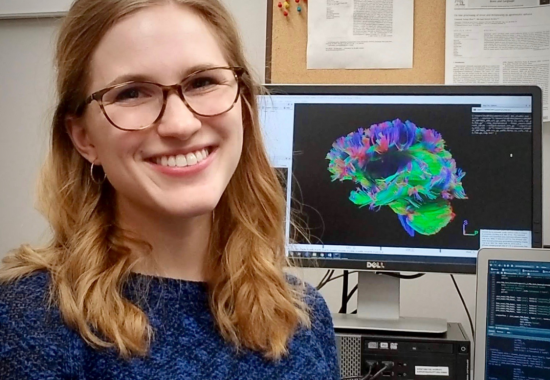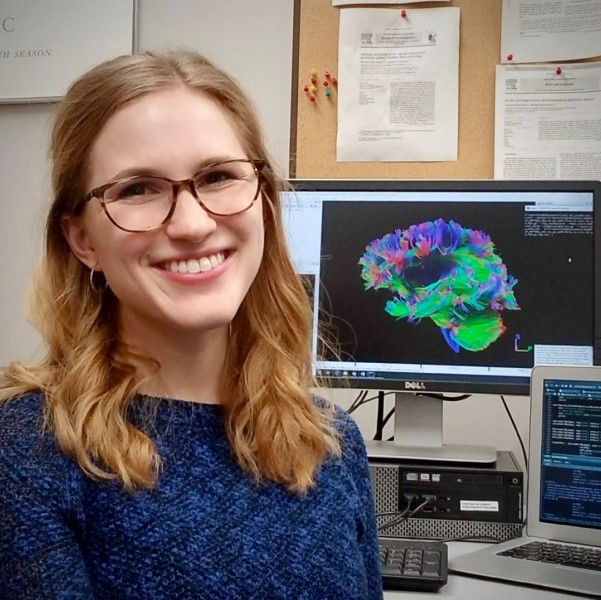Haley Dresang, PhD, joined Moss Rehabilitation Research Institute (MRRI) as a Postdoctoral Fellow in August of 2020. Since then she has been working with MRRI Associate Director Laurel Buxbaum, PsyD, and Roy H. Hamilton, MD, MS, Associate Professor at The University of Pennsylvania on a project investigating the use of gestures and brain stimulation to enhance language in people after stroke. In this interview, she shares more about her career, her research interests, and how she spends her time outside of the lab.
1) Can you tell us more about your academic background and training?
I began in academia studying neurobiology and Spanish as a pre-medical student at the University of Wisconsin-Madison. I volunteered in a cellular neuroscience lab for a year, but I was eager to have more direct work with patients. Then I joined the lab of Lyn Turkstra, PhD, where I had the opportunity to research cognitive and communication impairments in patients living with traumatic brain injury. For me, this was the perfect coalescence of neuroscience, linguistics (I have always loved languages.), and patient care.
I went on to earn my PhD in communication science and disorders at the University of Pittsburgh with a concentration in neuroscience from the Center for the Neural Basis of Cognition at Carnegie Mellon University. During my doctoral studies, my work centered on aphasia, which is a communication disorder following brain damage such as stroke or neurodegenerative disease. My mentor, Mike Dickey, PhD, provided me opportunities to work across multiple institutions and departments, including cognitive psychology (Tessa Warren, PhD), the VA Pittsburgh Medical Center (Will Hula, PhD), and neurosurgery at the University of Pittsburgh Medical Center (UPMC; Frank Yeh, MD, PhD). My research has developed from this multidisciplinary training, with a specific focus on elucidating how undamaged brain systems can be leveraged to improve function following neurological injury.
2) What attracted you to the field of neurorehabilitation?
I have had chronic migraines since age 12, and this condition has involved a long journey of auras, medication resistance, side effects, and neurology visits. Through this experience, I became fascinated by how little is known about the human brain. I also learned about the challenges and stigmas associated with neurological conditions, which are often considered “invisible illnesses.” Working in the field of neurorehabilitation enables me to feed my curiosity about the brain and to help others, while working toward improving disparities in medicine.
3) Why did you decide to work at MRRI?
The NIH-funded T32 postdoctoral fellowship provides a terrific training program, including seminars and workshops specifically designed for early-career researchers in translational neuroscience and neurorehabilitation. The shared environment between the University of Pennsylvania (Penn, where I hold my primary position) and MRRI offers me a unique opportunity where I can work across multiple disciplines with neuroscientists, neurologists, cognitive scientists, speech-language pathologists, and motor scientists. I admire the patient-centered work done at MRRI, and I look forward to joining the impressive group of scholars who have completed this T32 program.
4) What are some of the things you hope to learn or skills you hope to develop as a postdoc?
One of my goals is to work with patients with a variety of neurological disorders that affect cognition and communication. Over the past year, I have had the opportunity to research conditions including post-stroke aphasia, limb apraxia, primary progressive aphasia, Alzheimer’s disease, and Parkinson’s disease. Another goal I have is to develop expertise in neuroplasticity. I am learning different forms of non-invasive brain stimulation (NIBS) and the specific ways in which they can alter brain activity in service of rehabilitation. I have also gained experience in analyzing NIBS data along with neurophysiological and genetic biomarkers of neuroplasticity to improve our understanding of language recovery following strokes. (A preprint of that research is available here.) The goal I am working toward next is writing a grant proposal that will facilitate my transition to becoming an independent investigator.
5) Can you tell us more about a research project you are currently working on?
I am involved in many research projects through Penn, MRRI, and various collaborations. One new project I am leading will integrate multimodal gesture cues with non-invasive brain stimulation to investigate how activating undamaged semantic brain networks can help stroke patients with aphasia find and produce words more effectively. Read more about this project here.
6) What are the potential impacts your work may have in terms of future research and patient care?
My work makes contributions toward understanding how the human brain recovers from injury to support language, memory, and action. This research can inform prognostics for functional recovery and facilitate the development of precision medicine approaches in rehabilitation by improving predictions of which patients will respond best to different types of treatment.
My work also provides evidence for how patients may adapt to rely more heavily on relatively undamaged cognitive systems to improve both language and movement. This can guide development of neurorehabilitation strategies that target ancillary cognitive systems, like semantic memory (one’s general knowledge about the world). Finally, my work also includes development of novel assessment measures, which provide new tools for researchers and clinicians to help detect the presence and impacts of specific impairments across many patient populations.
7) Can you describe some of the challenges you have faced in your research or your career?
I know I’m not alone in saying that COVID-19 presented numerous challenges for me, both personally and professionally. I completed my PhD, moved to a new city, started my postdoc, and became a primary caregiver during the pandemic. Despite these challenges, I received great support from my colleagues, and I managed to make meaningful progress on a number of research projects this past year.
8) What have been some of your most memorable experiences in your first year at MRRI?
I have really grown from meeting new people through MRRI. There is an inspiring community of postdoc fellows, who have helped me navigate the pandemic, provided me with project feedback, and enhanced my professional development. I have also met many scientists and clinicians through virtual meetings and events. It is wonderful to learn different perspectives from such a diverse set of experts. Moving forward, I am particularly excited to work on a new project with an international group of female clinician-scientists led by Drs. Laurel Buxbaum and Gabriella Vigliocco, PhD, who is a Scientist in Residence at MRRI.
9) What are your long-term career goals?
My overarching career goal is to advance scientific understanding of brain-behavior relationships and to translate this information to improve clinical medicine and rehabilitation. To achieve this goal, I aim to be a researcher or professor in an environment with strong connections between medical, academic, and scientific research teams. I believe that multidisciplinary collaborations are essential to advancing translational neuroscience and neurorehabilitation, and I relish opportunities to learn new and diverse perspectives.
10) How do you like to spend your time when you’re not working?
I have been out exploring Philadelphia a lot! I love taking long walks to explore the many parks, markets, museums, coffee shops, and restaurants around the city. I try to do something active and/or creative every day. Some of my hobbies include painting, photography, playing piano, reading, song writing, yoga, and trying new ways to work out – kickbox Tabata, barre, and Latin dancing are some of my current favorites. Finally, I am very excited to start traveling when it is safe again!



3 comment on “Meet MRRI Postdoctoral Fellow Haley Dresang”